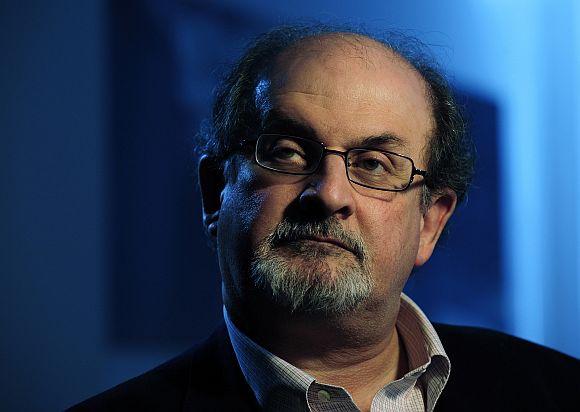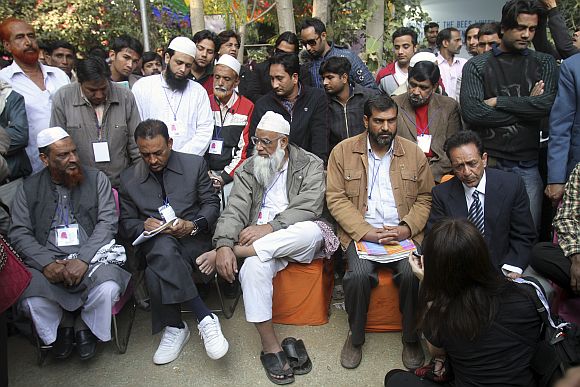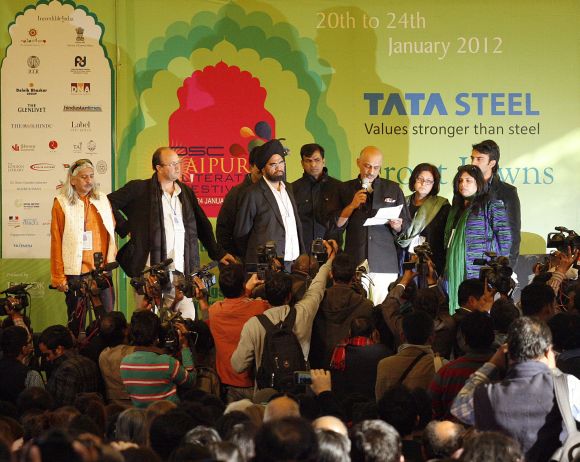
Furious over the cancellation of his video address to Jaipur Literature Festival, Salman Rushdie on Tuesday slammed the central and Rajasthan governments, saying the buck stops with it for the "awful" situation and questioned the commitment of Congress over the issue.
The controversial India-born author also hit out at the Muslim groups opposed to him and wondered whether India was moving towards totalitarianism like China by allowing extremist groups to dictate terms.
He asserted that he would come to India whenever his busy schedule permits without allowing "these religious gangsters and their cronies in the government to stop me" and asked the government to "deal with it".
Please ...
Click here for more Realtime News on Salman Rushdie!

Soon after his much-anticipated video address was cancelled at the last moment because of fears of violence, Rushdie tweeted, "Awful. Threat of violence by Muslim groups stifled free speech today."
The author, who has been castigated by certain Muslim groups for his 23-year-old book 'Satanic Verses', underlined, "In a true democracy all get to speak, not just the ones making threats."
The decision to call off the address came after a meeting festival organisers had with leaders of Muslim organisations.
"The fact that Indian government could not defend my desire to come there means the buck stops with the government. The Rajasthan government behaved as it did. This is a scandalous state of affairs," Rushdie told NDTV.
Inferring that he was disallowed from coming to India or even address the festival because of the assembly elections in Uttar Pradesh, he said, "I have some skepticism about how genuine their (government's) commitment was. It was very convenient to everyone in the Congress that I not come just before the UP vote."
"I thought the whole thing was fantastically fishy. The way in which the Congress party in government, or in Rajasthan, and many other parties all stated their opposition, I felt confident that some way would be found to prevent me from coming. And sadly it was," Rushdie said.
"I will come to India many times, do what I want and will not allow these religious gangsters and their cronies in the government to stop me. I will come most certainly and many #215 most certainly so deal with it," he said.

The renowned author said he was at a loss to understand why he was disallowed from coming to India when he had already done so a number of times earlier and questioned the argument of threats from fundamentalists as projected.
"Everyone says it's connected to the UP elections and the desire to collect Muslim votes... I have been coming and going a lot. Suddenly, let alone my physical presence, even on screen is unacceptable. Shocking," he observed.
Asked who should be blamed, he replied, "In a society, you can't compartmentalise blame. It's the responsibility of everyone.... Currently the leaders who claim to be leaders of Muslims are at fault. The fact that the political system wants to placate those leaders, that is the fault of the political system."
On reports of threat to his life, he said, "It seems incredibly fishy to me. I feel like fool to have given in."
Referring to the names of those who were reportedly paid to target him if he visited India, Rushdie said two of the three were "non-existent" names.
"The Centre denied it. The Mumbai police denied it. Some in Rajasthan denied it. But I was sent this (email) with knowledge of senior officials. It is a very, very poor state of affairs," he said.
At the same time, he agreed that his presence in India could have caused threat to "everyone" at the festival.
He, however, added that a vast majority of Muslims "does not give a damn whether I come or go. They have their concerns about their economic situation, prospects in the country."